Peppermint Oil Benefits: 12 Health-Boosting Uses & Remedies
From treating stomach issues to enhancing the skin texture, this refreshing oil can do wonders.
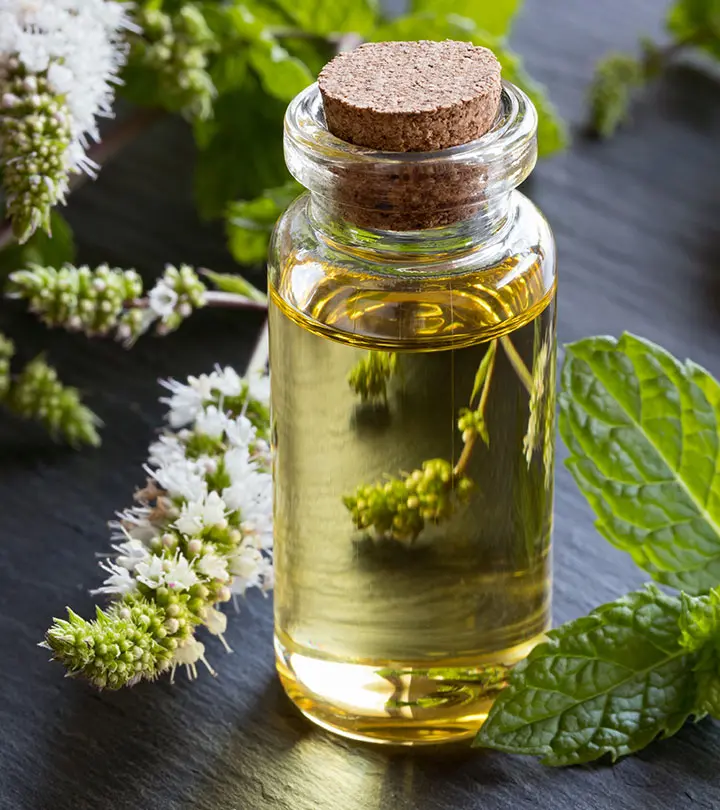
Image: Shutterstock
The benefits of peppermint oil make it a valuable remedy for many common ailments. The aromatic peppermint (Mentha piperita) is a hybrid plant native to North America and Europe. People use this versatile oil for medicinal purposes, cooking, and cosmetics.
Several properties in this oil provide relief from sore muscles, itchiness, headaches, sunburns, and dental issues. You can also use it to eliminate rodents and pests around your home.
The health benefits of peppermint oil include treating gastrointestinal conditions like nausea, flatulence, stomach cramps, and IBS. In addition, peppermint has antibacterial and anti-inflammatory properties that might make hair and skin healthy.
This article discusses the benefits of peppermint oil, its recommended dosage, and any potential side effects. Take a look.
 Know Your Ingredient: Peppermint Oil
Know Your Ingredient: Peppermint OilWhat Is It?
A yellow-colored oil extracted from the peppermint plant.
What Are Its Benefits?
Improves overall hair, skin, and gut health, relieves sore muscles, and heals chronic wounds.
Who Can Use It?
Anyone except children under the age of 5.
How Often?
30 drops of peppermint essential oil per ounce of carrier oil in case of adults and 3 drops in case of children.
Caution
Avoid it if you have a deficiency of G6PD, heart and liver disease, asthma, and kidney disorders.
In This Article
What Is Peppermint Oil?
Peppermint oil is extracted from the stem, leaves, and flowers of the peppermint plant. It is used extensively in aromatherapy due to its soothing scent. Edible-grade peppermint oil is used for consumption.
Peppermint oil is pale yellow in color and contains omega-3 fatty acids, iron, magnesium, calcium, vitamins A and C, potassium, manganese, and copper. The main volatile components of peppermint essential oil are menthol and menthone (1).
 Trivia
TriviaPeppermint oil also has antiviral, antibacterial, anti-inflammatory, antispasmodici A class of drugs that helps relieve or prevent involuntary muscle spasms or stomach convulsions. , and carminativei Refers to drugs or the ability of a compound to aid gastric issues and relieve flatulence. properties. It is, therefore, used for many purposes. Let us look at them in detail.
Key Takeaways
- Peppermint oil can treat migraine and provide headache relief. It also has healing properties.
- This oil helps your muscles relax and reduces your back, knee, and neck pain.
- Peppermint oil is an excellent aid to nausea and vomiting during pregnancy.
- It also improves skin health and promotes hair regrowth.
Uses Of Peppermint Oil
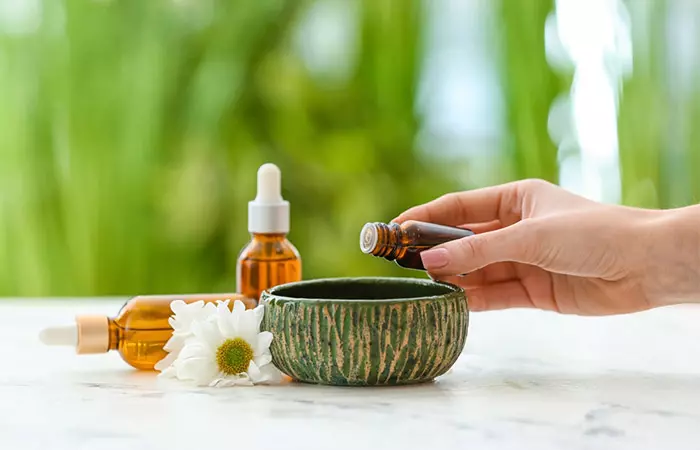
The fresh minty flavor of peppermint is invigorating and has been used as a popular flavoring agent in many products such as chewing gums, insect repellents, and skincare products. Few popular uses of peppermint oil are discussed below.
- Peppermint Oil For Oral Health: Many commercially available products contain peppermint oil or extract not only for its refreshing flavor but also for its antibacterial properties.
Scientific research has found that peppermint oil is powerful in fighting oral pathogens. The antibacterial and antifungal properties of peppermint oil help in fighting the bacteria and other microflora that exist in our mouth (3). The menthol in this oil also has an analgesici Medicine or compounds that can temporarily relieve pain caused by injury or other issues. effect (2). Thus, it may help reduce toothaches by killing the bacteria that cause gum disease, oral cavities, and other oral health problems.
- Peppermint Oil For Stress Relief: Peppermint works wonders on aching muscles and stiff joints by providing much-needed muscle relaxation. The analgesic properties of can oil help in reducing pain and providing relief (2).
The soothing effect of peppermint oil may also help relax the body and mind. It is calming and helpful in reducing stress, like most essential oils. Peppermint oil is a safe, non-toxic, and cheaper substitute for painkillers (4).
- Peppermint Oil As Insect Repellent: Peppermint oil is an effective insecticide as it can repel insects such as mosquitoes with its strong smell. Its strong minty smell is unpleasant to the insects, so it keeps them away. It is a natural substance to combat fleas on your pets as well (5).
- Peppermint Oil For Weight loss: Peppermint oil can suppress appetite by controlling cravings through your senses of taste and smell (6). Always consult a doctor before making any changes to your diet.
- Peppermint Oil For Allergies: Peppermint oil is said to be an effective remedy for treating seasonal allergies as it clears the nasal airways and relaxes the muscles. In combination with other essential oils (such as eucalyptus oil), it is even more effective in providing relief from allergies. This could be due to the antimicrobial properties of the menthol present in peppermint oil (7).
- Peppermint Oil For Hormonal Balance: Peppermint oil has been found to balance hormones. In an animal study conducted on 40 Wistar rats with PCOS (polycystic ovarian syndrome), peppermint oil was found to balance hormones. It especially lowered androgensi Refers to a group of male sex hormones that plays a crucial role in sexual health and development. such as testosterone, regulated the levels of estrogen and LH, and reduced ovarian cysts. However, this was a short-term experiment and more research on human subjects is needed to fully understand the role of peppermint oil in treating PCOS (8).
- Peppermint Oil For Nail Care: The antifungal activity of the components in peppermint oil may help reduce the growth and spread of fungi such as candida (3). Candida usually causes infections on feet and nails. Thus, peppermint oil may be applied to the nails to reduce fungal infection.
Here are some practical ways to incorporate peppermint oil into your daily routine:
- Diffuse peppermint oil to refresh your mind, reduce stress, and improve focus.
- Add a few drops of peppermint oil to your shampoo or conditioner to stimulate hair growth and promote a healthy scalp.
- Enhance the flavor of dishes like tea, desserts, and sauces with a few drops of peppermint oil.
- Create a natural cleaning solution by mixing peppermint oil with water and vinegar to disinfect surfaces and leave a fresh scent. This will also keep insects and bugs away.
Ancient texts from Egypt, Greece, and Rome mention the medicinal uses of peppermint. Many of its purported health benefits are based on personal experience, and there is research in progress to verify its health benefits. However, there is some scientific data available in the public domain on the health benefits of peppermint oil that supports natural healing that you can check out below.
Benefits Of Peppermint Oil
1. May Improve Digestion

Traditionally, peppermint oil was used to cure various digestive problems such as gas, heartburn, bloating, and indigestion. One of the lesser-known peppermint benefits is that it can be used as a natural carminative, meaning that it relaxes the abdominal muscles and relieves flatulence. A study conducted on the effect of the menthol present in this oil on the smooth muscles of the human colon found that menthol directly inhibits the colon muscle by blocking the calcium influx. This induces a spasmolytici A drug or a treatment that aids in relieving, preventing, and controlling muscle spasms and convulsions. effect on the gastrointestinal muscle (9). This effect could aid digestion and stomach emptying.
During gastrointestinal endoscopyi A medical procedure in which a thin tubular camera is inserted down the throat to examine the stomach and small intestine. , the stomach starts convulsing. This is why the patient needs to be given antispasmodic drugs, which usually have side effects. Peppermint oil has been used as an aid to facilitate colonoscopic procedures. An investigative study was conducted on patients undergoing a medical procedure called endoscopic retrograde cholangiopancreatography (ERCP). It concluded that peppermint oil is an effective antispasmodic with no side effects (10).
Another study found that peppermint oil is effective as an antispasmodic drug during esophagogastroduodenoscopyi A medical procedure that involves the insertion of a thin tube down the throat to examine respiratory and digestive organs. on elderly people (11). This could reduce the complications that arise with medical interactions as peppermint is a natural alternative to drugs. This medical application of peppermint oil needs more experimental validation.
2. May Help Treat Irritable Bowel Syndrome
Peppermint oil has been used as a natural remedy for treating IBS for a long time. Peppermint oil has an anti-inflammatory effect, which helps in alleviating the abdominal pain and other symptoms associated with IBS (12), (13), (14).
A review of all the research conducted on peppermint oil and its effect on the gastrointestinal system reported that it is extremely effective because it regulates calcium channels and cation receptors and works directly on the enteric nervous systems (15).
A study using enteric-coated peppermint oil capsules to treat IBS was published in the Journal of Clinical Gastroenterology. Though the results were promising, more long-term research is required to substantiate these claims (16).
A meta-analysis of 12 randomized trials with 835 patients showed that peppermint oil is a safe and effective treatment for IBS. This comes as a relief because most drugs available over the counter contain peppermint (17).
Though preliminary clinical trials have been conducted on the effect of peppermint oil, more comprehensive experimental validation is necessary (18).
3. Acts As A Nasal Decongestant
Peppermint oil infused with relaxing fragrance is soothing on inflamed nasal passages when inhaled while suffering from cold or flu
(19). The relaxant property of menthol makes it an excellent expectoranti Medicine used to treat congestion. It promotes the secretion of accumulated mucus and saliva in the respiratory system. , decongestant, and analgesic. The respiratory mucous congests the passages during cold and cough. Peppermint oil thins the mucous and provides relief as the mucus is expelled out from the body. The sinus cavities are opened up, so it is easier to breathe. Most respiratory tract-related issues such as cold, cough, sore throat, sinus, or bronchitis can be treated with peppermint oil (20). You can also add this oil to a mix of coconut oil, eucalyptus oil, and lemon oil in order to prepare your DIY vapor rub. Thus, it is a safe, cost-effective, and non-toxic alternative to commercial drugs.
4. May Alleviate Skin Conditions Like Skin Irritation And Itching
The cooling sensation imparted by the soothing effect of Peppermint oil is useful for reducing skin irritation and itching (21).
In extreme cases such as psoriasis (a condition where the skin becomes dry, scaly, and itchy), peppermint oil may be applied for relief. According to a few studies, severe itching or chronic pruritus can also be treated with peppermint oil (22), (23).
5. May Ease Headache And Migraine
Peppermint oil is an all-natural treatment for headaches (24). The menthol in peppermint oil has analgesic properties (1). Therefore, it may help relax the throbbing muscles and ease a headache.
6. May Help In Treating Gastrointestinal Conditions
Peppermint oil, in combination with caraway oil, is effective in treating functional dyspepsia, a condition where the gastrointestinal area becomes bloated and painful (25).
Peppermint oil is also helpful in reducing the duration, frequency, and severity of abdominal pain in children (26). However, there is limited research on the safety and dosage of peppermint oil for this treatment.
Peppermint oil also works on stomach muscles and sphincter muscle to help reduce acid reflux and heartburn (27), (28).
7. Helps Reduce Postoperative Nausea
Postoperative nausea and vomiting (PONV) can be reduced by inhaling peppermint oil. A study conducted on patients undergoing cardiac surgery showed better results than drugs with the usual side effects like dysrhythmia and/or drowsiness (29), (30).
Nausea is a common side effect of chemotherapy. A combination of spearmint and peppermint oils significantly lowered nausea in cancer patients undergoing chemotherapy (31).
8. May Help In Treating And Healing Chronic Wounds
The efficiency of peppermint essential oil in treating infected wounds in mice was studied using nanostructured lipid carriers. Both in-vitro and in-vivo studies found that the antibacterial properties present in peppermint oil accelerate wound healing by stimulating certain factors such as FGF-2 and collagen synthesis (32).
Peppermint oil has shown an antibacterial effect on a spectrum of bacteria such as Escherichia coli, Salmonella typhimurium, Pseudomonas aeruginosa, Staphylococcus aureus, Staphylococcus epidermidis, Bacillus anthracis, Staphylococcus pneumonia, and Listeria monocytogenes Species (32). Thus, it may help in treating infected wounds effectively.
A preliminary study based on scaffold engineering of tissue using peppermint oil was successful and is now in the initial stages of experimentation. This could innovate wound dressing and help in healing wounds faster (33), (34).
9. May Provide Relief To Sore Muscles
Anecdotal evidence suggests that peppermint oil can reduce soreness in muscles. In tablet form, peppermint oil has been found to relieve dysphagiai Refers to problems related to difficulty in swallowing food or liquids—usually a symptom of another underlying medical issue. and chest pain in cardiac patients (35).
Peppermint oil contains menthol and limonene. Both menthol and limonene have analgesic and anti-inflammatory properties that help in relaxing muscles (36). Peppermint oil helps reduce inflammation and swelling. It can be applied directly to the skin to treat arthritis, muscle aches, and headaches. It can also be ingested orally to ease digestive issues.
Peppermint is effective at relieving pain. It can be taken internally to alleviate menstrual cramps, migraines, and toothaches. Topical application can be used to treat minor burns and insect bites. Thus, peppermint oil is safe to use for treating back, knee, and neck pain.
10. May Reduce Nausea And Vomiting During Pregnancy
Peppermint oil is used as a home remedy for morning sickness. Studies have shown morning sickness or nausea accompanying pregnancy can be alleviated by inhaling peppermint oil. Research on this is mixed as a study showed that peppermint oil was no more effective than the placebo in treating nausea (37). However, aromatherapy using peppermint oil to treat postoperative nausea in women who underwent C-section has shown promising results (38). It can be applied topically to the chest, back, or abdomen.
Additionally, itching during pregnancy was found to be reduced upon the usage of peppermint oil in another study (39). Keep in mind that any alternative therapies or drugs used during pregnancy and lactation should have the approval of a licensed practitioner.
11. Has Antimicrobial Properties
Multiple studies have found that peppermint oil has antimicrobial activities. One of these studies investigates the antimicrobial activity of peppermint oil on the bacteria Staphylococcus aureus. Peppermint oil has high concentrations of menthol and its derivatives which inhibit the growth of this bacteria (40).
Peppermint oil has been found to inhibit antibiotic-resistant microbes too (41). Further studies on the exclusive role of peppermint oil can reveal the extent of its antimicrobial activity, especially on the antibiotic-resistant microbes.
Peppermint oil, in combination with clove, oil has shown antifungal activity against a few strains of Candida albicans (a common yeast) (42).
The antimicrobial properties of peppermint oil help fight off bacteria, viruses, fungi, and parasites. The oil works well against cold sores, flu, and even acne. You can use it topically to disinfect wounds and cuts or ingest it to relieve nausea and stomach pain.
12. Antioxidant Properties
Peppermint contains high levels of antioxidants. When consumed, these antioxidants boost the immune system and protect cells from damage caused by free radicals.
Peppermint oil is often used in cosmetic products. But, there’s limited research on the potential benefits of peppermint for skin and hair. A few benefits of peppermint oil for skin and hair are discussed below.
Is Peppermint Oil Good For Your Skin?
Peppermint oil has a soothing and calming effect which is helpful in reducing inflammation during skin allergies, rashes, and sunburns (21).
Peppermint oil has to be mixed with a carrier oil before applying directly to the skin. The antimicrobial activity of peppermint oil helps inhibit the growth of bacteria on the face (40). It can help control acne as it prevents the clogging of pores due to excess secretion of oil (43).
Peppermint oil forms a protective barrier on the skin and maintains skin integrity. A study showed that it reduced the absorption of benzoic acid in a dose-dependent manner (44).
Here’s how you can use peppermint oil on your face.
Caution: Do a patch test with peppermint oil before using it on your face.
How To Use Peppermint Oil For Face
1. peppermint oil Facial Scrub
You Will Need
- 4 drops peppermint oil
- 2 tablespoons olive oil
- 3 teaspoons table salt
Process
- In a plastic bowl, mix the table salt and olive oil.
- Add the peppermint essential oil to the mixture and mix well.
- Scrub your freshly washed face gently with this mixture for a wonderful exfoliation session.
- Repeat this process every three days to get radiant and healthy skin.
2. peppermint oil Toner
You Will Need
- 115 ml filtered water
- 40 ml apple cider vinegar
- 30 drops peppermint oil
- Spray bottle
Process
- Prepare a bottle of your favorite peppermint toner by mixing filtered water and apple cider vinegar.
- Add the peppermint essential oil.
- Use it as a facial mist throughout the day.
- Store it in the refrigerator in a spray bottle.
3. Peppermint Oil Facial Mask For Clear Skin
You Will Need
- 2 tablespoons cucumber, grated
- 2 tablespoons green clay
- 5 ml diluted peppermint oil
Process
- Whisk the grated cucumber and peppermint oil together in a plastic bowl.
- Add the green clay to the mixture.
- Apply the paste all over your face.
- Let it dry completely before washing it off with warm water.
- Repeat this process twice a week.
4. Peppermint Oil For Lips
You Will Need
- 6 teaspoons beeswax pastilles (or grated beeswax)
- 6 teaspoons shea butter
- 6 teaspoons coconut oil
- 20 drops peppermint essential oil
- Lip balm tins or tubes
Process
- Melt all the ingredients in a double boiler.
- Add the peppermint oil.
- Mix well and pour the mixture in lip balm tins or tubes.
- Let it cool, and cover when set.
Is Peppermint Oil Good For Your Hair?
Peppermint oil is a non-toxic ingredient that promotes hair growth. Peppermint oil improves circulation, so it nourishes the hair and scalp. It stimulates the hair follicles so more nutrients are absorbed, thus promoting hair growth (45). Therefore, it could also be a great alternative medicine for repairing dry and damaged hair as it has the ability to enhance the penetration of nutrients and other carrier oils.
Anecdotal evidence suggests that peppermint essential oil can help prevent hair loss and get rid of dandruff and lice, but more research is needed to back this claim.
A YouTuber shared her positive experience using peppermint essential oil on her hair and edges to combat postpartum shedding and promote hair growth. She showcased her personal results, particularly in filling in bald spots and revitalizing her edges. The vlogger emphasized the need for diluting the oil and cautioned viewers against her preference of using the undiluted version, ”I’m just showing you what I do to my hair and my scalp, and it’s working well for me. I’m not telling you to try this at home. Do not try this at home (i).”
Apart from these, using peppermint oil for the hair has many other benefits, which you may explore before using the oil. Once you have gained an understanding of its mechanism and benefits, you may follow the methods discussed in the next section to use it for hair.
How To Use Peppermint Oil For Hair Growth
1. As A Shampoo
You Will Need
- Shampoo (16 oz)
- 1 teaspoon peppermint oil
Process
- Mix the peppermint oil into the shampoo.
- Shake well before each use to make sure the oil is well distributed.
- Wash your hair as per usual.
2. As A Nourishing Hair Oil For Scalp
You Will Need
- 5-10 drops peppermint oil
- 4 tablespoons coconut oil
Process
- Mix the peppermint and coconut oil together
- Massage the oil into your hair.
- Wash it off after 2 hours.
3. Peppermint Oil For Scalp Health And Dandruff
You Will Need
- 20 drops peppermint oil
- 2 oz coconut oil
- 1 teaspoon vitamin E oil
- 2 teaspoon moringa oil
- 10 drops tea tree oil
Process
- Add the ingredients to warm coconut oil and let the mixture cool down.
- Apply the mixture to the scalp.
- Leave it on for a couple of hours before washing it off.
Peppermint oil is available in a variety of forms in the market. Check them out below.
Types/Forms Of Peppermint Oil
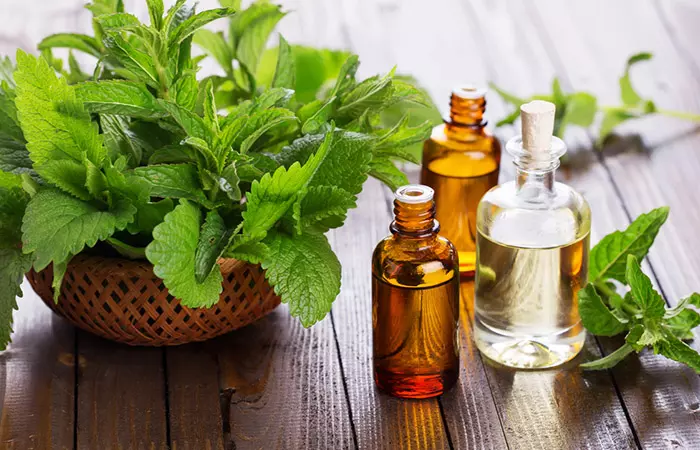
Peppermint oil can be found in a variety of forms. Some examples include:
- Essential oil – A highly-concentrated liquid extract from the leaves, stems, flowers, bark, and roots of the peppermint plant.
- Peppermint extract – A more diluted form that can be used to add a peppermint flavor to foods.
- Peppermint capsules – Can be taken as dietary supplements.
Want to know even more about peppermint oil? Scroll down to the next section!
More About Peppermint Oil
Scientific Name: Mentha piperita
Family: Lamiaceae
HowTo Use Peppermint Oil For Health
Essential oils can be inhaled or used topically. It is not recommended to consume them unless you are using a therapeutic-grade essential oil.
The cardinal rule when using essential oils is to always use them in conjunction with a carrier oil such as olive oil or coconut oil. Most essential oils are highly potent as they are in a concentrated form. According to the National Association for Holistic Aromatherapy (NAHA), essential oils should be inhaled after diluting them in a bowl of boiling water. Aromatherapy diffusers, such as electric or candle diffusers, help in oil diffusion without direct contact.
1. Peppermint Oil For Cold, Cough, And Sore Throat
You Will Need
- 8 drops of peppermint essential oil
- 2 tablespoons coconut or olive oil
Process
- Mix the ingredients in a bowl.
- Rub the mixture on your chest to aid breathing when you have a cold. Adding this mixture to hot water and inhaling the steam will open up your nasal airway and provide relief.
2. Peppermint Essential Oil For Sore Throat Pain
You Will Need
- 1-2 drops of peppermint essential oil
- A glass of warm water
- ½ teaspoon natural rock salt
Process
- Mix all the ingredients in a glass.
- Gargle with this mixture twice a day.
3. Peppermint Oil For Nasal Congestion
You Will Need
- 1/2 cup carrier oil (coconut oil or olive oil)
- 2 tablespoons beeswax pastilles (or grated beeswax)
- 15 drops peppermint oil
- 20 drops eucalyptus oil
Process
- Melt the beeswax and carrier oil in a double boiler.
- Add the essential oils.
- Stir the mixture and pour it in a container.
- Once set, apply it to your chest and below the feet.
- Store in a cool, dry area.
- Repeat as needed.
4. Peppermint Oil For Heartburn And Indigestion
You Will Need
- 2-3 drops peppermint oil
- 1 teaspoon olive oil
Process
- Mix all the ingredients well.
- Massage the mixture gently on the stomach.
5. Peppermint Oil For Headache
You Will Need
- Few drops of jojoba oil
- Few drops of peppermint essential oil
Process
- Mix the oils together.
- Massage this mixture gently on your forehead/temples to reduce a headache.
6. Peppermint Oil For Itching
You Will Need
- l 1 tablespoon moringa oil
- l 5-7 drops peppermint essential oil
Process
- Mix the oils together.
- Gently apply the mixture to the affected area. Substitute with sandalwood oil to treat psoriasis and eczema.
7. Peppermint Oil For Sunburn
You Will Need
- 1 tablespoon of any carrier oil
- 7 drops of peppermint essential oil
Process
- Mix the oils together.
- Apply the mixture to cool down burns and scalds.
 Quick Tip
Quick Tip8. Peppermint Oil For Weight Loss
Inhale a few drops of peppermint oil directly or use a diffuser to help curb cravings.
9. Peppermint Oil For Joint Pain And Arthritis
You Will Need
- 8-10 drops peppermint oil
- 8-10 drops eucalyptus oil
- 1 to 1 1/2 tablespoons of any carrier oil (coconut oil or moringa oil)
Process
- Mix the ingredients well.
- Apply the mixture to the affected area for relief.
10. Peppermint Oil For Sore Muscles
You Will Need
- 5-10 drops of peppermint oil
- 1-2 teaspoons olive oil
Process
- Mix the ingredients well.
- Apply the mixture to the sore muscles for relief.
How To Use Peppermint Oil For Oral Health
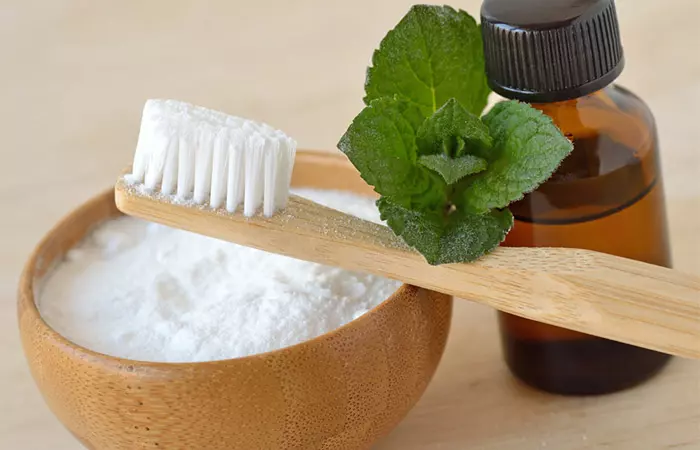
1. Peppermint Oil Toothpaste
You Will Need
- 1-2 drops peppermint oil
- Toothpaste
Process
- Take some toothpaste on your toothbrush.
- Put a couple of drops of peppermint oil on the paste and brush as usual.
2. Peppermint Oil Mouthwash
You Will Need
- 5-6 drops peppermint oil
- 2 cups of water
- 5-6 drops tea tree oil
Process
- Mix all the ingredients well.
- Use this mixture as a mouthwash for cleaner and fresher breath.
3. Peppermint Oil For Teething Problems In Babies
Blend 4-5 drops of peppermint oil with 4-5 drops of coconut or olive oil. Rub and massage the gum area with this mixture. This is particularly useful when babies are teething. However, consult a doctor before using this remedy.
How To Use Peppermint Oil At Home
1. Peppermint Oil Insect Repellent
You Will Need
- 12 oz witch hazel
- 15 drops citronella essential oil
- 15 drops lemongrass oil
- 10 drops peppermint essential oil
- 10 drops tea tree oil
- Glass spray bottle
Process
- Mix the witch hazel with all the other oils.
- Pour it in a glass spray bottle.
- Shake well and spray when required.
- You can also apply a drop of concentrated peppermint oil to your skin or clothes to repel mosquitoes.
2. Peppermint Oil Bug Spray
You Will Need
- 8 oz witch hazel
- 8 oz water (boiled or distilled)
- 20 drops oregano oil
- 20 drops peppermint essential oil
- Glass spray bottle
Process
- Blend these ingredients and pour the mixture in a glass spray bottle.
- Shake well and spray when required. As oregano is also a natural insecticide, this spray is very effective against bugs.
Alternatively, you can also soak a few cotton balls with peppermint essential oil and keep them at strategic places to ward off spiders, ants, rodents such as mice and rats.
3. Peppermint Oil For Lice
You Will Need
- 2 tablespoons shampoo
- 1 teaspoon neem oil
- 20 drops oregano oil
- 15 drops peppermint essential oil
Process
- Blend all the ingredients.
- Shampoo your hair as usual.
- Additionally, you can use a nit comb to clean your hair properly.
Now, let us look at the appropriate dosage of peppermint and the precautions we need to follow.
Dosage And Precautions
The National Association for Holistic Aromatherapy (NAHA) recommends using 30 drops of essential oil per each ounce of carrier oil for adults. Children should not have more than 3 drops of essential oil per each of carrier oil.
Always use peppermint essential oil with a carrier oil such as jojoba, olive, coconut, or sweet almond oil. Since essential oils are very concentrated, they can cause burns or irritation on the skin.
Peppermint oil can cause an allergic reaction in some people. Please do a patch test before using it anywhere else on your body.
The essential oils for consumption are of therapeutic grade and should be taken only under medical supervision. The FDA does not regulate peppermint oil for its purity, quality, and safety. The manufacturer’s guidelines need to be followed carefully.
Who Shouldn’t Use Peppermint Oil?
Peppermint oil is considered safe to use (4). However, there are a few exceptions. Let us look at the specific cases where peppermint oil is considered unsafe to use.
People with G6PD deficiency
Peppermint oil is found to have adverse reactions in people who suffer from G6PD deficiency. Research on what makes people with G6PD deficiency susceptible to the risk is limited.
People taking certain medication
CYP3A4 is an enzyme in your body that helps in assimilating many medications. Peppermint oil has a tendency to negatively interact with and inhibit this enzyme.
Children and babies
Many essential oils are not safe for children. Use peppermint oil on babies and children under 5 years old only after consulting a doctor.
Peppermint aromatherapy can also be toxic to pets such as dogs and cats.
Preexisting health conditions
Peppermint oil may aggravate certain pre-existing health conditions such as heart disease, asthma, kidney disorders, and liver disease.
Check out the side effects of peppermint oil in the next section.
What Are The Side Effects Of Peppermint Oil?

Despite the many benefits of peppermint oil, there are few side effects that should be kept in mind while using it. Sometimes ingesting peppermint can lead to heartburn, nausea, and vomiting
Peppermint oil is very potent and the menthol in it may cause allergic reactions in some people (46). Therefore, it is recommended to do a patch test before you use it.
Little quantities of peppermint oil may be consumed, but larger doses are toxic due to the presence of a substance called pulegone. In fact, it could even prove to be fatal (46).
- Drug Interactions
Peppermint oil, though soothing, can interact with certain medications. It may affect the absorption and metabolism of some drugs processed by the liver. This interaction may lead to altered medication levels in the bloodstream, potentially impacting their effectiveness or causing side effects. Generally, it increases the levels of amitriptyline, cyclosporine (Sandimmune), and haloperidol (Haldol) in the bloodstream (47).
Hence, if you have been prescribed these medications but also take or are considering peppermint oil supplements or topically use large amounts of the oil, it is advisable to consult your healthcare professional or pharmacist first. They can provide guidance on any potential drug interactions to ensure safe use of both your medication and peppermint oil.
Infographic: 5 Good Reasons For Using Peppermint Oil
Peppermint oil is one of the most beneficial oils that help treat several ailments. It is rich in magnesium, iron, and other essential nutrients that may help treat digestive issues and skin allergies. Scroll down and check out the infographic below to understand how peppermint oil can improve your overall health.
Some thing wrong with infographic shortcode. please verify shortcode syntaxPeppermint oil is extracted from the leaves of the peppermint plant so it retains its benefits. The benefits of peppermint leaves include their anti-inflammatory, antiviral, and antibacterial properties, which help treat several ailments. This versatile oil is infused with magical aroma and has been used for different purposes. The various vitamins, minerals, omega-3 fats, and antioxidants are responsible for the many peppermint oil benefits that aid your health. It exhibits anti-inflammatory, antiviral, and antibacterial properties that help treat several ailments. Peppermint oil may help reduce pain, aid in weight loss, improve digestion, treat irritable bowel syndrome, and relieve many respiratory tract-related diseases. In addition, it reduces inflammation in skin conditions like allergies, sunburns, and rashes. However, using large doses of this oil may cause allergic reactions too. Hence, use it in moderation and consult your doctor in any emergencies.
Frequently Asked Questions
Can I drink peppermint oil?
Yes, food-grade peppermint oil is safe for consumption in small doses. Make sure to source it from a reputed manufacturer and ingest it under medical supervision as peppermint oil in large doses and in certain people can be toxic.
Does peppermint oil give you energy?
Peppermint essential oil can help in relieving stress and be invigorating as it boosts mental focus and concentration. You can inhale it directly or apply it topically at the nape of your neck. Adding it to your bath is also another option.
Does peppermint oil help you sleep?
Peppermint has a soothing and calming effect so it may help you sleep. However, the research on it is inconclusive (48).
Does peppermint oil tighten skin?
Peppermint oil has astringent properties (49). It can be used externally to tighten the skin and minimize the appearance of pores.
Does peppermint raise blood pressure?
No. On the contrary, research suggests that peppermint may help lower blood pressure levels (50).
Illustration: Benefits Of Peppermint Oil For Skin, Hair, Health & How To Use
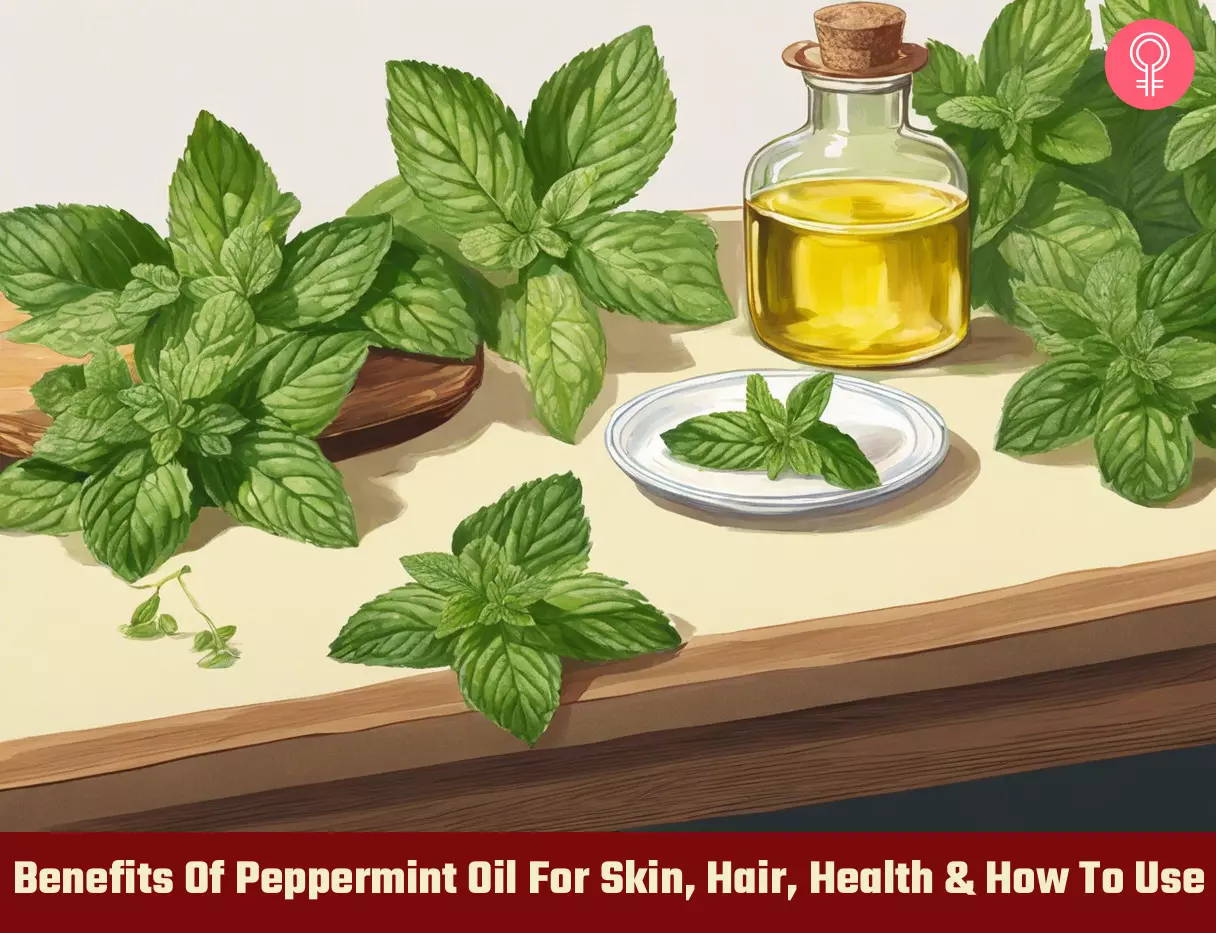
Image: Stable Diffusion/StyleCraze Design Team
References
Articles on StyleCraze are backed by verified information from peer-reviewed and academic research papers, reputed organizations, research institutions, and medical associations to ensure accuracy and relevance. Read our editorial policy to learn more.
- Peppermint, fresh.
https://fdc.nal.usda.gov/food-details/173474/nutrients - Menthol: a natural analgesic compound, Neuroscience letters, US National Library of Medicine, National Institutes of Health.
https://pubmed.ncbi.nlm.nih.gov/11897159/ - Selected Essential Oils as Antifungal Agents Against Antibiotic-Resistant Candida spp.: In Vitro Study on Clinical and Food-Borne Isolates, Microbial Drug Resistance, US National Library of Medicine, National Institutes of Health.
https://pubmed.ncbi.nlm.nih.gov/27092733/ - Final report on the safety assessment of Mentha Piperita (Peppermint) Oil, Mentha Piperita (Peppermint) Leaf Extract, Mentha Piperita (Peppermint) Leaf, and Mentha Piperita (Peppermint) Leaf Water, International journal of toxicology, US National Library of Medicine, National Institutes of Health.
https://pubmed.ncbi.nlm.nih.gov/11766133/ - Larvicidal and mosquito repellent action of peppermint (Mentha piperita) oil, Bioresource Technology, ScienceDirect.
https://www.sciencedirect.com/science/article/pii/S0960852499000796 - Review article: The physiologic effects and safety of Peppermint Oil and its efficacy in irritable bowel syndrome and other functional disorders
https://www.ncbi.nlm.nih.gov/pmc/articles/PMC5814329/ - Antimicrobial screening of Mentha piperita essential oils, Journal of Agricultural and Food Chemistry, US National Library of Medicine, National Institutes of Health.
https://pubmed.ncbi.nlm.nih.gov/12083863/ - Potential effects of Mentha piperita (peppermint) on Letrozole- induced polycystic ovarian syndrome in female albino rat, International Journal of Advanced Research, Academia.
https://www.academia.edu/27795139/Potential_effects_of_Mentha_piperita_peppermint_on_Letrozole-induced_polycystic_ovarian_syndrome_in_female_albino_rat?auto=download - Effects of menthol on circular smooth muscle of human colon: analysis of the mechanism of action, European Journal of Pharmacology, US National Library of Medicine, National Institutes of Health.
https://pubmed.ncbi.nlm.nih.gov/25046841/ - Efficacy of peppermint oil as an antispasmodic during endoscopic retrograde cholangiopancreatography, Journal of Gastroenterology and Hepatology, Wiley Online Library.
https://onlinelibrary.wiley.com/doi/abs/10.1111/j.1440-1746.2006.04307.x - Peppermint Oil Solution Is Useful as an Antispasmodic Drug for Esophagogastroduodenoscopy, Especially for Elderly Patients, Digestive Diseases and Sciences, SpringerLink.
https://link.springer.com/article/10.1007/s10620-012-2194-4 - Peppermint oil (Mintoil) in the treatment of irritable bowel syndrome: a prospective double blind placebo-controlled randomized trial, Digestive and Liver Disease, US National Library of Medicine, National Institutes of Health.
https://pubmed.ncbi.nlm.nih.gov/17420159/ - Efficacy of Peppermint oil in diarrhea predominant IBS – a double blind randomized placebo – controlled study, Mymensingh Medical Journal, US National Library of Medicine, National Institutes of Health.
https://pubmed.ncbi.nlm.nih.gov/23416804/ - Review article: the physiological effects and safety of peppermint oil and its efficacy in irritable bowel syndrome and other functional disorders, Alimentary Pharmacology &Therapeutics, US National Library of Medicine, National Institutes of Health.
https://www.ncbi.nlm.nih.gov/pmc/articles/PMC5814329/ - Review Article: The Physiological Effects and Safety of Peppermint Oil and Its Efficacy in Irritable Bowel Syndrome and Other Functional Disorders, Alimentary Pharmacology &Therapeutics, US National Library of Medicine, National Center of Biotechnology Information.
https://pubmed.ncbi.nlm.nih.gov/29372567/ - Peppermint oil for the treatment of irritable bowel syndrome: a systematic review and meta-analysis, Journal of Clinical Gastroenterology, US National Library of Medicine, National Institutes of Health
https://pubmed.ncbi.nlm.nih.gov/24100754/ - The impact of peppermint oil on the irritable bowel syndrome: a meta-analysis of the pooled clinical data, BMC Complementary and Alternative Medicine, US National Library of Medicine, National Institutes of Health.
https://www.ncbi.nlm.nih.gov/pmc/articles/PMC6337770/ - Peppermint Oil for the Treatment of Irritable Bowel Syndrome: Optimizing Therapeutic Strategies Using Targeted Delivery (PERSUADE), US National Library of Medicine, National Institutes of Health.
https://clinicaltrials.gov/study/NCT02716285 - Antioxidant components of naturally-occurring oils exhibit marked anti-inflammatory activity in epithelial cells of the human upper respiratory system, Respiratory Research, US National Library of Medicine, National Institutes of Health.
https://www.ncbi.nlm.nih.gov/pmc/articles/PMC3154159/ - Antimicrobial efficacy of five essential oils against oral pathogens: An in vitro study, European Journal of Dentistry, US National Library of Medicine, National Institutes of Health.
https://www.ncbi.nlm.nih.gov/pmc/articles/PMC4054083/ - Methods and topical formulations comprising colloidal metal for treating or preventing skin conditions, US20100055138A1.
https://patents.google.com/patent/US20100055138A1/en - Effectiveness of topical peppermint oil on symptomatic treatment of chronic pruritus, Clinical, Cosmetic and Investigational Dermatology, US National Library of Medicine, National Institutes of Health.
https://www.ncbi.nlm.nih.gov/pmc/articles/PMC5066694/ - Effective symptomatic treatment for severe and intractable pruritus associated with severe burn-induced hypertrophic scars: A prospective, multicenter, controlled trial, Burns, US National Library of Medicine, National Institutes of Health.
https://pubmed.ncbi.nlm.nih.gov/27207739/ - National Center for Complementary and Integrative Health (NCCIH), U.S. Department of Health and Human Services, National Institutes of Health.
https://www.nccih.nih.gov/health/peppermint-oil - A randomized placebo‐controlled trial on the effects of Menthacarin, a proprietary peppermint‐ and caraway‐oil‐preparation, on symptoms and quality of life in patients with functional dyspepsia, Neurogastroenterology & Motility (NMO), Wiley Online Library.
https://onlinelibrary.wiley.com/doi/abs/10.1111/nmo.13132 - Herbal Medicines for Gastrointestinal Disorders in Children and Adolescents: A Systematic Review, Pediatrics, US National Library of Medicine, National Institutes of Health.
https://pubmed.ncbi.nlm.nih.gov/28562281/ - Gastrointestinal clinical pharmacology of peppermint oil, Phytomedicine, ScienceDirect.
https://www.sciencedirect.com/science/article/abs/pii/S0944711305001066 - Peppermint oil reduces gastric spasm during upper endoscopy: a randomized, double-blind, double-dummy controlled trial, Gastrointestinal Endoscopy, ScienceDirect.
https://www.sciencedirect.com/science/article/abs/pii/S0016510703800111 - Inhaled peppermint oil for postop nausea in patients undergoing cardiac surgery, Nursing, US National Library of Medicine, National Institutes of Health.
https://pubmed.ncbi.nlm.nih.gov/27333231/ - The Effect of Aromatherapy on Postoperative Nausea in Women Undergoing Surgical Procedures, Journal of PeriAnesthesia Nursing, ScienceDirect.
https://www.sciencedirect.com/science/article/abs/pii/S1089947212003164 - Antiemetic activity of volatile oil from Mentha spicata and Mentha × piperita in chemotherapy-induced nausea and vomiting, Ecancermedicalscience , US National Library of Medicine, National Institutes of Health.
https://www.ncbi.nlm.nih.gov/pmc/articles/PMC3562057/ - Encapsulation of Peppermint essential oil in nanostructured lipid carriers: In-vitro antibacterial activity and accelerative effect on infected wound healing, Colloids and Surfaces A: Physicochemical and Engineering Aspects, ScienceDirect.
https://www.sciencedirect.com/science/article/abs/pii/S0927775718308665 - Electrospun Combination of Peppermint Oil and Copper Sulphate with Conducive Physico-Chemical properties for Wound Dressing Applications, Polymers, US National Library of Medicine, National Institutes of Health.
https://pubmed.ncbi.nlm.nih.gov/30960571/ - Topical application of Mentha piperita essential oil accelerates wound healing in infected mice model, Inflammopharmacology, SpringerLink.
https://link.springer.com/article/10.1007/s10787-018-0510-0 - Impact of Peppermint Therapy on Dysphagia and Non-cardiac Chest Pain: A Pilot Study, Digestive Diseases and Sciences, US National Library of Medicine, National Institutes of Health.
https://pubmed.ncbi.nlm.nih.gov/30771044/ - Analgesic-Like Activity of Essential Oil Constituents: An Update, International Journal of Molecular Sciences, US National Library of Medicine, National Institutes of Health.
https://www.ncbi.nlm.nih.gov/pmc/articles/PMC5751100/ - Effect of Aromatherapy with Peppermint Oil on the Severity of Nausea and Vomiting in Pregnancy: A Single-blind, Randomized, Placebo-controlled trial, Journal of Reproduction &Infertility, US National Library of Medicine, National Institutes of Health
https://www.ncbi.nlm.nih.gov/pmc/articles/PMC5960050/ - Examination of the effectiveness of peppermint aromatherapy on nausea in women post C-section, Journal of Holistic Nursing, US National Library of Medicine, National Institutes of Health.
https://pubmed.ncbi.nlm.nih.gov/22034523/ - The effect of peppermint oil on symptomatic treatment of pruritus in pregnant women, Iranian Journal of Pharmaceutical Research, US National Library of Medicine, National Institutes of Health.
https://www.ncbi.nlm.nih.gov/pmc/articles/PMC3813175/ - Peppermint oil decreases the production of virulence-associated exoproteins by Staphylococcus aureus, Molecules, US National Library of Medicine, National Institutes of Health.
https://www.ncbi.nlm.nih.gov/pmc/articles/PMC6259925/ - Selected Essential Oils as Antifungal Agents Against Antibiotic-Resistant Candida spp.: In Vitro Study on Clinical and Food-Borne Isolates, Microbial Drug Resistance, US National Library of Medicine, National Institutes of Health.
https://pubmed.ncbi.nlm.nih.gov/27092733/ - Candida albicans Impairments Induced by Peppermint and Clove Oils at Sub-Inhibitory Concentrations, International Journal of Molecular Sciences, US National Library of Medicine, National Institutes of Health.
https://www.ncbi.nlm.nih.gov/pmc/articles/PMC5486128/ - Antimicrobial effects of Indian medicinal plants against acne-inducing bacteria, Tropical Journal of Pharmaceutical Research, African Journal Online.
https://www.ajol.info/index.php/tjpr/article/view/14651 - Natural Oils Affect the Human Skin Integrity and the Percutaneous Penetration of Benzoic Acid Dose‐Dependently, Basic & Clinical Pharmacology & Toxicology, Wiley Online Library.
https://onlinelibrary.wiley.com/doi/full/10.1111/j.1742-7843.2006.pto_388.x - Peppermint Oil Promotes Hair Growth without Toxic Signs, Toxicological Research, US National Library of Medicine, National Institutes of Health.
https://www.ncbi.nlm.nih.gov/pmc/articles/PMC4289931/ - A near fatal case of high dose peppermint oil ingestion- Lessons learnt, Indian Journal of Anaesthesia, US National Library of Medicine, National Institutes of Health.
https://www.ncbi.nlm.nih.gov/pmc/articles/PMC3546250/ - Peppermint Oil American Family Physician Journal.
https://www.aafp.org/pubs/afp/issues/2007/0401/p1027.html - Preliminary investigation of the effect of peppermint oil on an objective measure of daytime sleepiness, International Journal of Psychophysiology, ScienceDirect.
https://www.sciencedirect.com/science/article/abs/pii/S0167876004001722 - Protective effects of Mentha piperita L. leaf essential oil against CCl4 induced hepatic oxidative damage and renal failure in rats, BMC Lipids in Health and Disease, US National Library of Medicine, National Institutes of Health.
https://www.ncbi.nlm.nih.gov/pmc/articles/PMC5761127/ - Effects and Safety of Menthol on Blood Pressure and Metabolic Parameters in Prehypertensive and Mild Hypertensive Patients (ESMAB), Clinical Trials, National Institutes of Health.
https://clinicaltrials.gov/study/NCT01408446
Read full bio of Reda Elmardi
Read full bio of Ravi Teja Tadimalla
Read full bio of Arshiya Syeda
Read full bio of Aparna Mallampalli






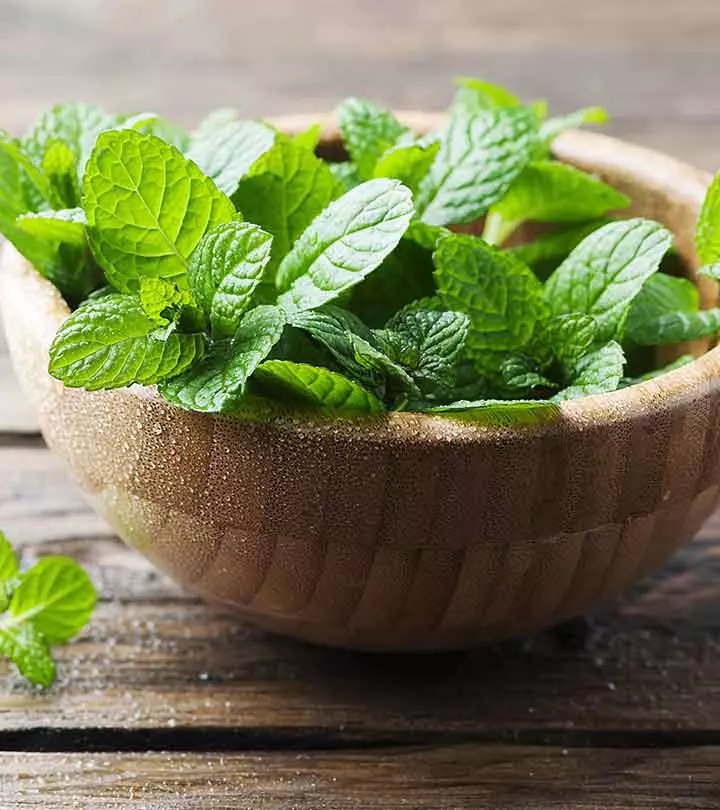
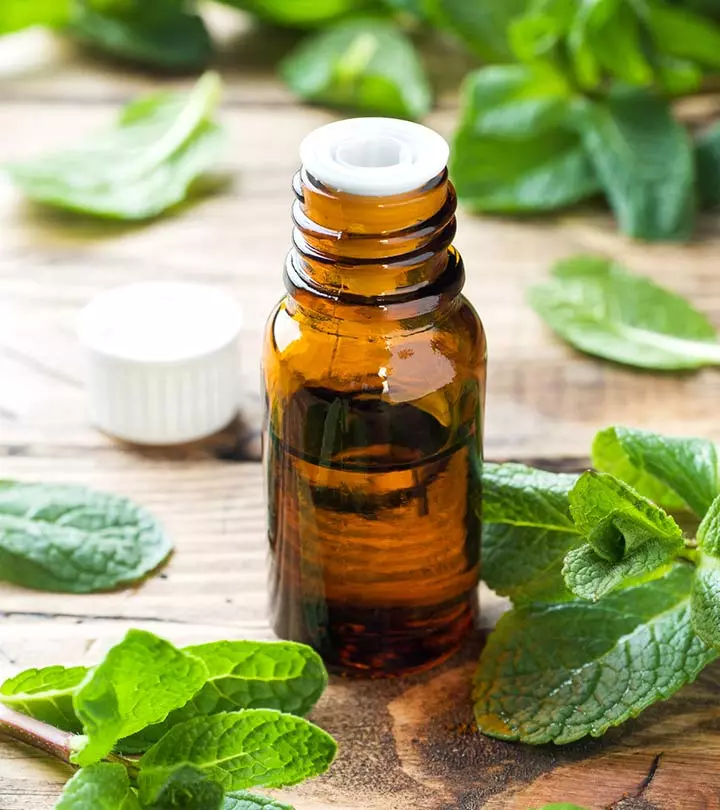

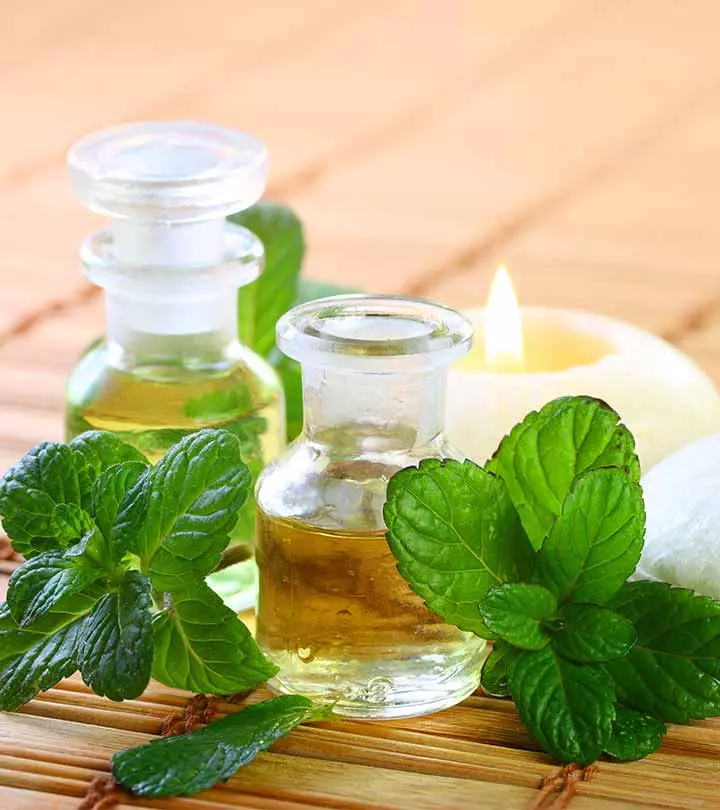

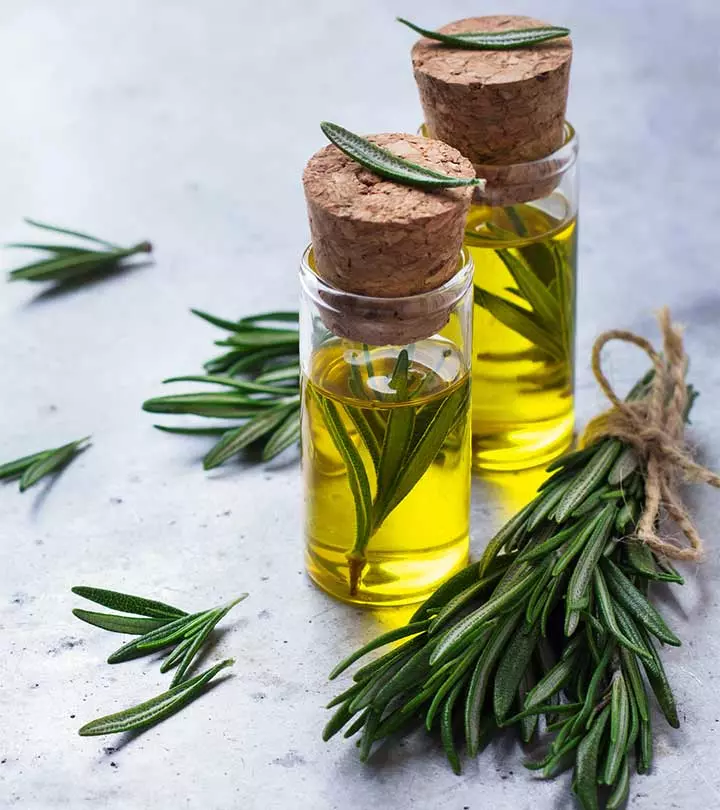


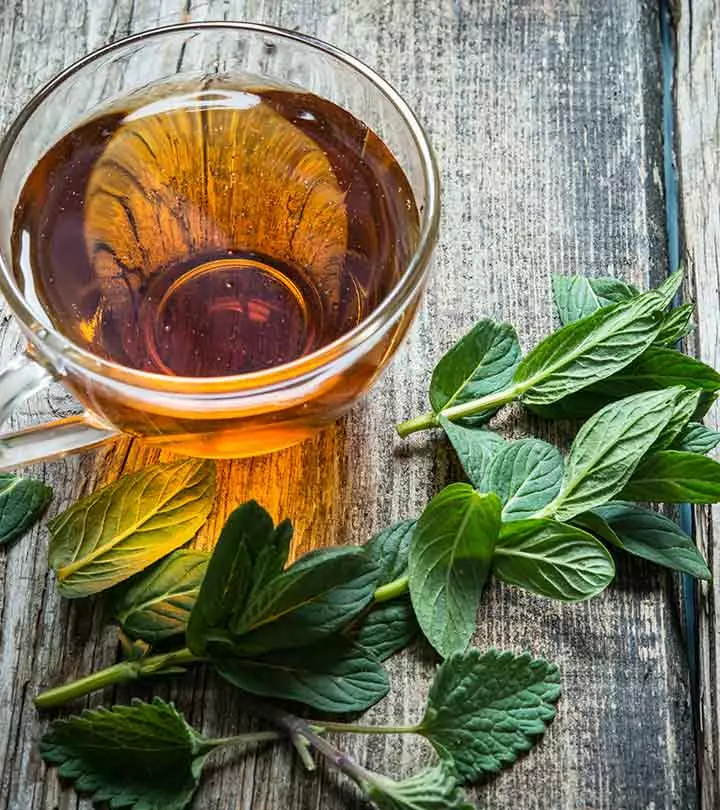
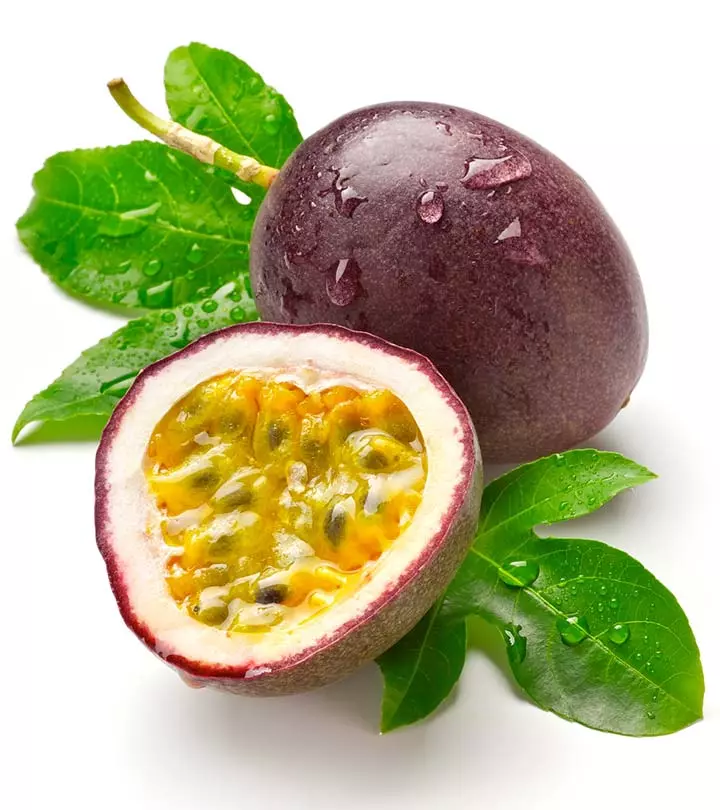






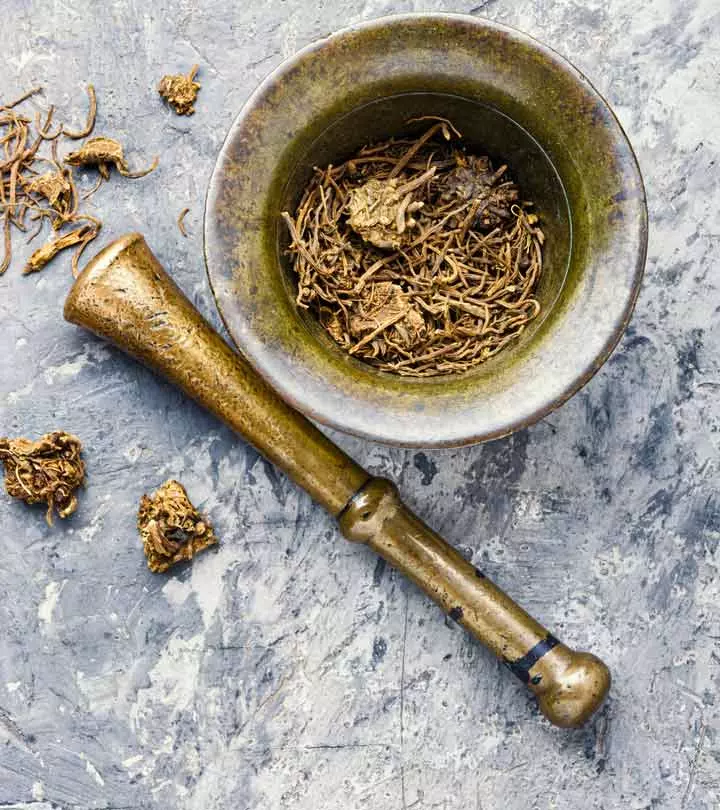
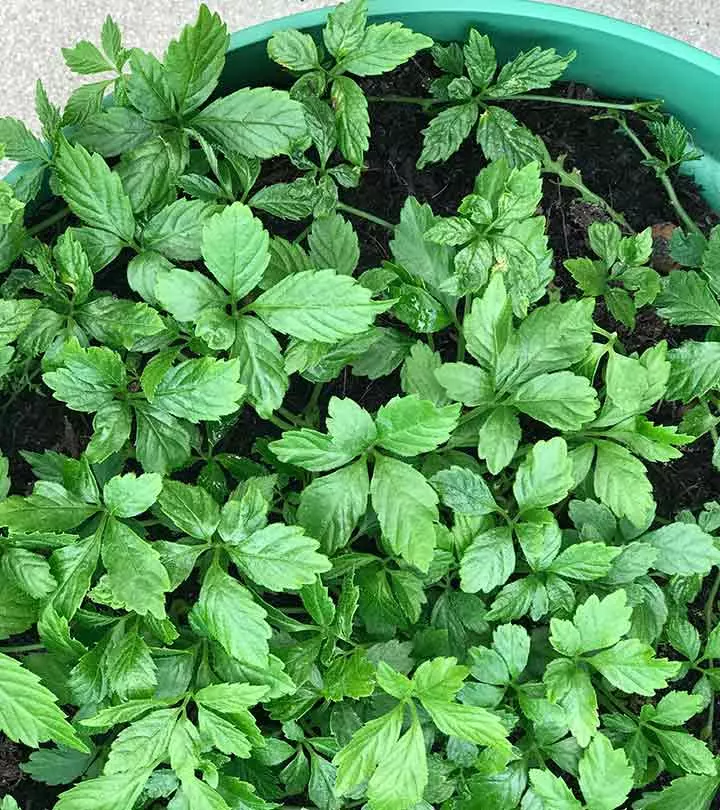



Community Experiences
Join the conversation and become a part of our empowering community! Share your stories, experiences, and insights to connect with other beauty, lifestyle, and health enthusiasts.